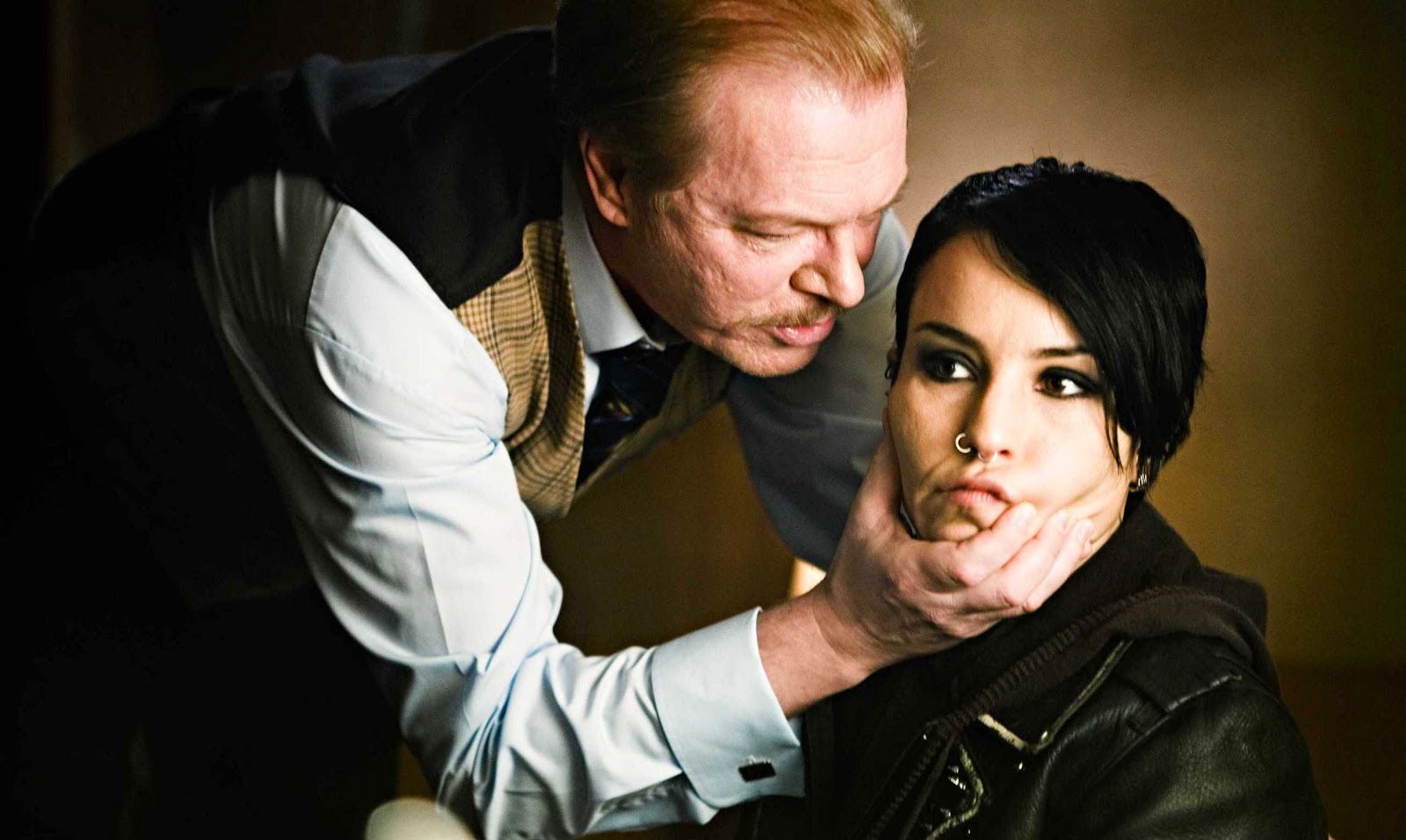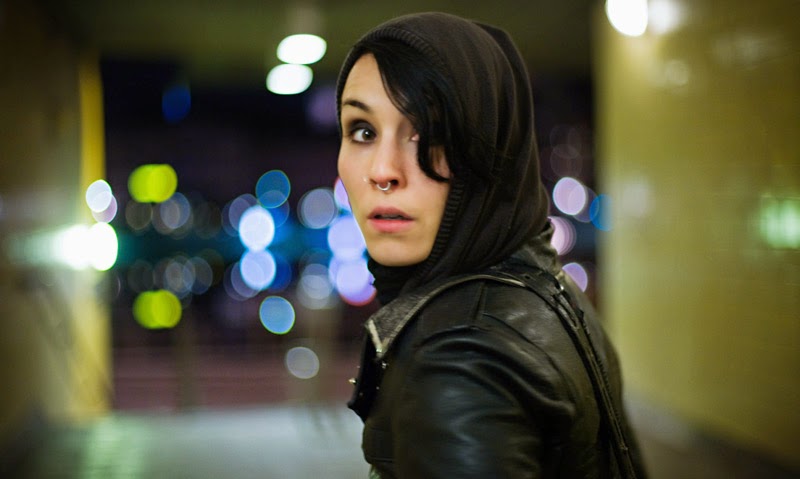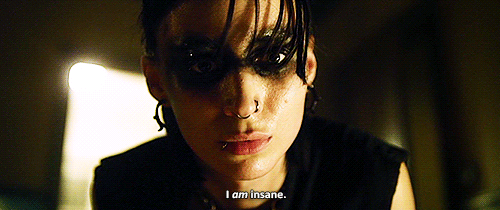To be totally honest, I don't actually feel like I can do full and complete justice to this topic. Lisbeth Salander in The Girl with the Dragon Tattoo (and sequels) is one of the most complex and baffling characters to arise in the past twenty years, and everyone and their mother has mixed feelings about her. But I've been mulling on this topic for almost a year now, and I worry that if I don't write it now, I never will.
The reason why all of us are all befuddled about Lisbeth Salander (played by Noomi Rapace in the Swedish movie and Rooney Mara in the American) is deceptively simple. Basically, she appears to be the feminist, kickass heroine of a book/movie series where she fights against institutionalized racism, sexism, and the abuse of power. She's a vigilante for women in need, a cyberpunk savior. So in that sense, she's everything we've been waiting for.
But she is also defined primarily through her relationship with the much more milquetoast Mikael Blomkvist, a reporter who happens to be hired on to investigate a cold case. Mikael, who is played by Michael Nyqvist (Swedish films) and Daniel Craig (American film), is a nice guy, but not actually all that interesting in and of himself. He's a moderately attractive, middle-aged, decently intelligent reporter whose one solid attribute is his ability to find trouble.
When he's hired on by a wealthy industrialist to solve the decades old murder of the man's niece, Mikael hits a ton of brick walls in the investigation, and eventually needs help. In the book, that help comes from Lisbeth, who has hacked his computer and is monitoring his actions for her own reasons. She reaches out to Mikael with a solution to his problem, and he in turn tracks her down and asks her to help. In the American film, however, it is Mikael who decides that he needs help, and it is he who takes the initiative to track down Lisbeth.
This reversal speaks to the larger problem with Lisbeth as a character. Because aside from the mostly sensationalized plot in the book, the real story revolves around Lisbeth and Mikael's relationship. Which is fine, theoretically, but in this case it's a little messed up.
Here's why.
Lisbeth Salander is an interesting character precisely because she is so screwed up. The product of an incredibly unstable childhood (with an abusive/potentially murderous father and a victimized mother), Lisbeth has been labeled as "troubled" and now lives as a ward of the state. She is not considered adult enough to hold property or conduct her own affairs. And instead of getting a caregiver, she is given a mostly disinterested caseworker.
The plot for the first book/movie, which is the one we're concerned with today, deals explicitly with Lisbeth's relationship with her caseworker. Her first worker, a kindly older man, mostly let her run her own life. She could work at her job, control her own money, pay her bills, and all that. Lisbeth liked that, and she liked him. But then her caseworker has a stroke, and she is assigned to someone new.
This new man, Nils Bjurman, uses his position as her legal guardian to systematically take over Lisbeth's life. Now, instead of being mostly independent and only nominally a ward of the state, she is completely lost.
All of her money, all of her work, all of her life goes through Bjurman, who uses this leverage to extract sexual favors from Lisbeth. The violation increases in severity and scale, until finally Bjurman lures Lisbeth to his apartment and savagely rapes her. Having foreseen this probability, Lisbeth brought a hidden camera with her, and now has a tape of her rape. But instead of using this to turn Bjurman in to the authorities, she uses it to concoct her own revenge.
Filled with rage, Lisbeth breaks into Bjurman's house and assaults him, tying him down, blackmailing him, and finally tattooing the fact that he's a rapist on his chest.
From here, she is then immediately embroiled in Mikael's investigation and soon into that enters into a sexual relationship with him. She's the aggressor and initiator, but it's still uncomfortable as an audience and a reader, because you have to wonder what her headspace is right then.
Anyway, the rest of the story paints Lisbeth as an avenging angel, a liberated woman who is haunted by her past but still fully capable of self-determination. And that's great.
The problem I have with the whole story is that I can't get past a single thing: this book, and these movies, were written by men. These are men's interpretations of the motivation and actions of a female victim of sustained sexual abuse.
I'm not sure why, but that kind of bothers me. A lot.
 I guess it bothers me because so much about the relationship between Mikael and Lisbeth feels like the wish fulfillment of a middle-aged man. Lisbeth is considerably younger than Mikael, being in her early twenties, and is an emotionally damaged and "troubled" young woman who latches onto the middle-aged man who offers her stability and safety. Lisbeth loves Mikael long before he ever considers the possibility, and she reveals a frightening willingness to do anything for him.
I guess it bothers me because so much about the relationship between Mikael and Lisbeth feels like the wish fulfillment of a middle-aged man. Lisbeth is considerably younger than Mikael, being in her early twenties, and is an emotionally damaged and "troubled" young woman who latches onto the middle-aged man who offers her stability and safety. Lisbeth loves Mikael long before he ever considers the possibility, and she reveals a frightening willingness to do anything for him.More than that, the whole idea of Lisbeth as a character feels like something a man dreamed up to make himself feel better. Like, she's hot as hell, but desperately wants approval. She's dark and mysterious and cool, but also really damaged and fragile and needy. She's dangerous enough to provide a thrill, and soft enough to need a big strong man to take care of her.
And let's not even get into the whole thing in the later books where Lisbeth gets a boob job in order to "feel better about herself". Urgh.
The thing is, Lisbeth as a character has the potential to be a really interesting examination of a woman taking her life back after suffering horrible abuse. She's a sexual assault and abuse survivor, and she's strong and badass and cool, in charge of herself sexually and in all other ways. I want to love her.
But I can't. I just can't. Every version of her that I see feels like it's been filtered through so many lenses of male approval and sexualization that it makes me cringe. Take, for instance the American version of the story. David Fincher, the director, openly admitted that he cast Rooney Mara in the part because she felt so innocent and fragile. He had a strong hand in developing the look of the character, and it was his choice to put Mara as Lisbeth on the posters topless, with only Craig's Mikael preserving any of Lisbeth's "modesty" from the viewer.
It twists the whole concept of Lisbeth's body modifications, which make sense when one thinks of her as a victim of sustained sexual violence (tattoos and piercings are often used as a way of abuse victims to reclaim their bodies), into something more about the viewer than Lisbeth herself. Her piercings, her tattoos, her clothes - in this context they aren't something Lisbeth has control over, but something that the director and the writer have determined will titillate the audience and therefore should be included.
It's the knowledge that however much we want to view Lisbeth as a feminist hero, she is defined not by herself in the story, but by her relationship to the men in her life. Both the ones actually in the story, and the men who have a direct hand in shaping her story. It's really discomfiting. It kind of freaks me out.
Still, I don't know. I just don't. I don't know how I really feel about Lisbeth because there's still a big part of me that likes her. I want to love her, to embrace her, and to appreciate a woman who hunts down other people who hurt women. She's a pretty objectively interesting character.
If only there weren't this lingering stink of coercion over her. If only I didn't feel like she was always being controlled, coerced, manipulated into giving consent. If only I didn't feel like she was a figment of the middle-aged male imagination: the hot young thing who thinks you're all that and a bag of chips, who'll do anything for you, who will be the coolest girlfriend you've ever had, but who is so damaged that she needs you.
If only it weren't for all of that, I could totally love Lisbeth Salander.






Two years ago, I would have disagreed with you almost entirely. But since then we've seen a number of shows (I lean towards shows rather than films, because Girl with the Dragon Tattoo is totally better on the small-screen) that set really high bars for how stories depicting pervasive abuse should centre on its victims - high enough that I'm no longer certain GwtDT clears them).
ReplyDeleteOn the other hand - there's going to be a lot of that phrase in my comments - I've only seen the Swedish versions of the films, and not read the books, so I can't compare different versions of the story or characters.
On the gripping hand - because I can't resist using *that* phrase - I also think differently about GwtDT itself than about the trilogy as a whole.
But she is also defined primarily through her relationship with the much more milquetoast Mikael Blomkvist ... a nice guy, but not actually all that interesting in and of himself.
It never occurred to me to make this comparison before reading your post, but Lisbeth blows into his investigation, turns it upside down, both in technique and subject matter, saves his life, then blows out again, leaving him reinvigortated about his mission in life. Almost as if a manic pixie dream girl took time out from romantic drama and visited the world of outlaw journalism and conspiracy-busting. She even looks the part.
On the other hand...
Anyway, the rest of the story paints Lisbeth as an avenging angel, a liberated woman who is haunted by her past but still fully capable of self-determination.
... unlike the average manic pixie dream girl, she has an arc. Not just with Bjurman, but her plan to secrete a ton of money away and disappear. Which she successfully does.
But on the other and, we only ever see her from the outside, because, as you say...
you have to wonder what her headspace is right then.
In a way it's obvious: she doesn't want to be under the control of men like Bjurman and if she can escape (which she can of course because she's awesome like that) she will; the trouble is, those *are* obvious, on a par with eating when she gets hungry. Aside from the violence of her revenge on Bjurman and judgment of the murderer at the end, we don't get much of a sense of what anything in the films means to her and how she processes it.
Which leaves Blomkvist as pretty much the viewpoint character in a film based on a book whose original title was "Men Who Hate Women."
In the second two films, we see more of her insides. But on the other hand (perhaps this trilogy can only be adequately analysed by the bastard offspring of an octopus and centipede) she's much more of a victim in need of Blomkvist to save her, on several levels. She can have strength or insides, but not both. Even if she still gets to kick some ass in the end.
The problem I have with the whole story is that I can't get past a single thing: this book, and these movies, were written by men.
So is Orphan Black, except that Tatiana Maslany is heavily involved in creating details about her characters - particularly their histories, which will affect everything about what current events mean to them. And of course, Orphan Black is unstinting in making it about the clones - the nearest we have to a male lead, Felix, is the fifth or sixth most important character, depending on where you rank him next to Rachel, not the pretty much viewpoint character Blomkvist is.
(I have to say that Mara's/the Amercan Salander looks positively cartoonish next to Rapace's/the Swedish one).
Well this is an octopus of a conversation... :)
ReplyDeleteOh man. She totally is a manic pixie dream girl. Or maybe a manic pixie nightmare girl, but still. I hadn't made that connection either. I mean, she definitely exists in order to further Blomkvist's development and that story is really about her as plot device more than character, at least in the first one. Hmm.
Her whole thing with Bjurman and the money always just rubbed me the wrong way. Not sure why. It just didn't feel...honest? Real? Like a fully developed and realized character? Something like that.
She feels a bit like the Strong Female Characters from that Kate Beaton comic, you know?
I guess the difference I feel is that all of these projects were created by men, and the perspective is so relentlessly male in them. We never feel who the female characters are from the inside. Even with Harriet, we are constantly told who she is by the memories of her male relatives. We only barely get any female understanding of her as a person. The same goes for Lisbeth. She is translated through a male lens, and that bothers me.
The American movie is a well made movie, but a very very very different, and much more disturbing, take on the character.
Not sure why. It just didn't feel...honest? Real? Like a fully developed and realized character? Something like that.
ReplyDeleteThe sudden and extreme increase in savagery made it seem more like it was establish Bjurman as a bad guy than anything about Lisbeth herself; as if it wasn't already established by what he'd already done. Also, it bothers me that the most brutal of the rapes was also the time she was setting him up with the camera, which (sometimes) strikes me as creepily close to adding an "asking for it" vibe.
YES. That's the thing. Thank you for putting words to the thing.
DeleteWhich part? The about Bjurman or the creepily close?
DeleteBoth, really.
DeleteLOOOOOOVE this analysis! I loved Girl with a Dragon Tattoo when I first read the series, and I remember liking the U.S. version of the film (still haven't seen the Swedish ones yet) but as I look back on the story now, it makes me sick. It's totally about a dude doing wish fulfillment disguised as feminism.
ReplyDeleteDon't even get me started on how the director basically starved Rooney Mara. They kind of laugh about it in interviews but you can tell it's also true - he was literally telling her what she could eat. He used her body to make a movie about a women who's body and autonomy are being controlled by an evil man and a broken system...it makes me ill to think about.
Good article and generally nice blog. Visit also this source to know more about sprint family locator app.
ReplyDeleteESCORT
ReplyDeleteESCORTS
FEMALE ESCORTS SERVICE KOLKATA
KOLKATA FEMALE ESCORTS SERVICE
INDEPENDENT ESCORTS SERVICE
INDEPENDENT ESCOTRTS SERVIC KOLKATA
KOLKATA INDEPENDET ESCORTS SERVICE
RUSSIAN ESCORTS SERVICE KOLKATA
RUSSIAN ESCORTS SERVICE
KOLKATA RUSSIAN ESCORTS SERVICE
FOREIGN ESCORTS SERVICE IN KOLKATA
INDEPENDEN FOREIGN ESCORTS SERVICE
ESCORT FOREIGN SERVICE IN KOLKATA
SEXY FEMALE ESCORTS SERVICE
SEXY MODEL ESCORTS SERVICE
MODEL ESCORTS CALL GIRLS
MODEL ESCORTS CALL GIRLS SERVICE KOLKATA
CALL GIRLS SERVICE KOLKATA
CALL GIRLS IN KOLKATA
KOLKATA CALL GIRLS
KOLKATA CALL GIRLS
CALL GIRLS KOLKATA
After looking through a few blog articles on your website,
ReplyDeletewe sincerely appreciate the way you blogged.
We've added it to our list of bookmarked web pages and will be checking back in the near
future. Please also visit my website and tell us what you think.
Bitwig Studio Crack
WriteItNow Crack
ProgDVB Professional Crack
Pipe Flow Expert Crack
Deep Freeze Standard Crack
Duplicate Cleaner Pro Crack
Viber for Windows Crack
SoftwareNetz Cash Book Crack
DryLab System Crack
My Lockbox Pro Crack